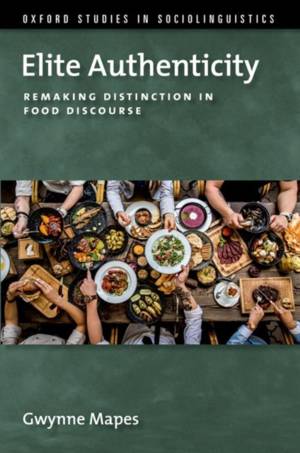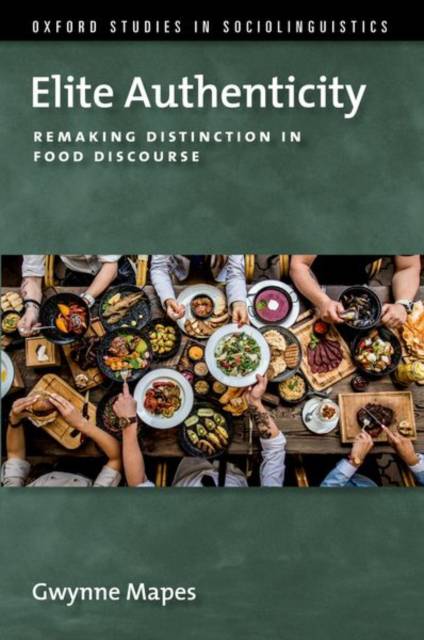
En raison d'une grêve chez bpost, votre commande pourrait être retardée. Vous avez besoin d’un livre rapidement ? Nos magasins vous accueillent à bras ouverts !
- Retrait gratuit dans votre magasin Club
- 7.000.000 titres dans notre catalogue
- Payer en toute sécurité
- Toujours un magasin près de chez vous
En raison de la grêve chez bpost, votre commande pourrait être retardée. Vous avez besoin d’un livre rapidement ? Nos magasins vous accueillent à bras ouverts !
- Retrait gratuit dans votre magasin Club
- 7.000.0000 titres dans notre catalogue
- Payer en toute sécurité
- Toujours un magasin près de chez vous
Description
Food plays a central role in the production of culture and is likewise a powerful resource for the representation and organization of social order. Status is asserted or contested through both the materiality of food (its substance, its raw economics, and its manufacture or preparation) and
through its discursivity (its marketing, staging, and the way it is depicted and discussed). This intersection of materiality and discursivity makes food an ideal site for examining the place of language in contemporary class formations, and for engaging cutting-edge debates in sociolinguistics on
language materiality. In Elite Authenticity, Gwynne Mapes integrates theories of mediatization, materiality, and authenticity in order to explore the discursive production of elite status and class inequality in food discourse. Relying on a range of methodological approaches, Mapes examines restaurant reviews and
articles published in the New York Times food section; a collection of Instagram posts from @nytfood; ethnographically-informed fieldwork in four renowned Brooklyn, NY, restaurants; and a recorded dinner conversation with six food-enthusiasts. Across these varied genres of data, she demonstrates how
a discourse of elite authenticity represents a particular surfacing of rhetorical maneuvers in which distinction is orchestrated, avowed/disavowed, and circulated. Elite Authenticity takes a multimodal critical discourse analysis approach, drawing on theories from linguistics, food and cultural studies, anthropology, sociology, and philosophy. Its presentation and analysis of aural, visual, spatial, material, and embodied discourse will be of interest to
scholars and students of communication studies, critical discourse studies, sociolinguistics, linguistic anthropology, and cultural geography.
through its discursivity (its marketing, staging, and the way it is depicted and discussed). This intersection of materiality and discursivity makes food an ideal site for examining the place of language in contemporary class formations, and for engaging cutting-edge debates in sociolinguistics on
language materiality. In Elite Authenticity, Gwynne Mapes integrates theories of mediatization, materiality, and authenticity in order to explore the discursive production of elite status and class inequality in food discourse. Relying on a range of methodological approaches, Mapes examines restaurant reviews and
articles published in the New York Times food section; a collection of Instagram posts from @nytfood; ethnographically-informed fieldwork in four renowned Brooklyn, NY, restaurants; and a recorded dinner conversation with six food-enthusiasts. Across these varied genres of data, she demonstrates how
a discourse of elite authenticity represents a particular surfacing of rhetorical maneuvers in which distinction is orchestrated, avowed/disavowed, and circulated. Elite Authenticity takes a multimodal critical discourse analysis approach, drawing on theories from linguistics, food and cultural studies, anthropology, sociology, and philosophy. Its presentation and analysis of aural, visual, spatial, material, and embodied discourse will be of interest to
scholars and students of communication studies, critical discourse studies, sociolinguistics, linguistic anthropology, and cultural geography.
Spécifications
Parties prenantes
- Auteur(s) :
- Editeur:
Contenu
- Nombre de pages :
- 220
- Langue:
- Anglais
- Collection :
Caractéristiques
- EAN:
- 9780197533444
- Date de parution :
- 09-06-21
- Format:
- Livre relié
- Format numérique:
- Genaaid
- Dimensions :
- 238 mm x 163 mm
- Poids :
- 467 g

Les avis
Nous publions uniquement les avis qui respectent les conditions requises. Consultez nos conditions pour les avis.






